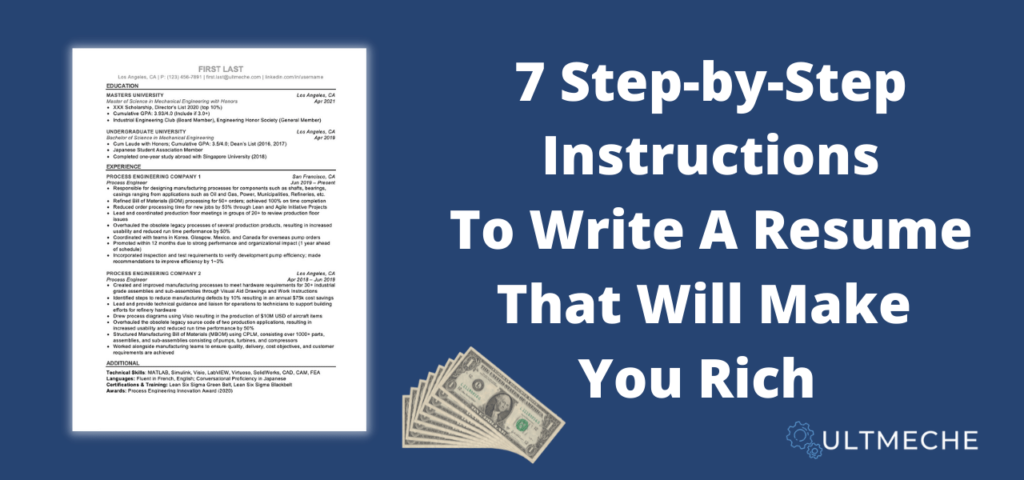No matter what stage you’re at in your career, you’ll need these step by step instructions on how to write a resume to make more money.
Because there’s so many different ways to write a resume, it’s hard to gauge what one is doing correctly. There are a lot of resume gurus out there that say conflicting things. We’re here to tell you that the step by step instructions on how to write a resume are simple. When in doubt – keep things simple. That’s the approach we take with our resumes and we’re going to show you how so you can land that sweet 20-50% pay raise.

Step 1 – Header
We’re going to be using Microsoft Word for our resume writing.
Double click the very top of the Word Doc file and you’ll open up the header.
Type the following in:

Full Name
We’re going to be using Arial Font, bold the first and last name, and make it to size 16.
Personal Info
The personal info underneath your first and last name should be your address, phone number, email, and linkedin. Separate these items using spacers onto your resume. The font of this should be Arial at size 11.
That’s all you need for the header!
Simple, right?
Step 2 – Experience
Note – All subsequent text we will be using in this resume format will be Arial Size 11 font.
We will call out specifically where we bold or italicize the text.

Experience is going to be the first section in the resume body that we will be working on.
You will need to come up with some specific bullet points for your resume.
If you’re an engineer, refer to the bullet points above and frame your experiences in a manner.
Some tips for creating bullet points on your resume include:
- Review the job description and implement keywords and phrases
- Include quantitative results and accomplishments wherever possible
- Keep things clear and concise
- Do not overcomplicate things
- Do not add too much “fluff”
- Don’t be soft skill oriented, be more hard skills and SPECIFIC accomplishment oriented
Company Name
Use CAPS, BOLD, and use a border underneath experience.
Additionally add a 3pt space between Experience and the Company Name.
The Company Name should be BOLD and in CAPS also.
To the right of the company name goes the City, ST of your employer.
Job Title
The job title for the specific employer will go right underneath the company name.
Italicize the font for the job title (like this).
To the right of the job title will go the years of service in a Mon Year – Mon Year format.
Example: Design Engineer Mon Year – Mon Year
If this is going to be for your current employer, use Mon Year – Present.
Step 3 – Education

Education is formatted similarly to Experience.
Just replace the employer name with the University name and replace job title with the degree title.
Place City, ST to the right of the University name and Mon Year of graduation to the right of the degree title.
Bullet points underneath university should consist of relevant activities such as clubs, scholarships, GPA, etc.
You should be joining relevant clubs and activities in your major at university – this gives you some more padding on your resume, networking opportunities, study parters, and even friends.
Having a consistent group to study with in college is underrated.
Step 4 – Additional

Everything else such as technical skills, certifications, and awards will be caught underneath the Additional section of your resume.
The additional section of your resume is not limited to just these things.
If you can think of anything relevant to the job you’re applying for, then put that information in this section.
Step 5 – Technical Skills
Technical Skills will refer to any specific HARD skill such as software that applies to your job title.
Some examples of software would be:
- Microsoft Office – Word, Excel, PowerPoint
- ERP (Enterprise Resource Planning) such as SAP
- Quickbooks
- Python, MATLAB, Javascript for programming
- CAD such as SolidWorks, Siemens NX, Creo Parametric for engineering
- Analysis methods such as rotor dynamic, static stress, structural, natural frequency
Step 6 – Certifications
Any specific certifications relating to the job that you’re applying for will go here.
Place items such as licenses, certs, trainings, and courses that you have taken over the course of your career that relates to what you’re applying for.
Some examples of certifications include those such as:
- Professional Engineering Licensure – (Ref NCEES)
- Certifications in Accounting
- Programming bootcamps
- Project Management Professional
- Lean 6S Green or Blackbelt
Step 7 – Awards
Put any and all awards that you’ve received related to your job.
Awards include those such as Dean’s lists, scholarships, placing in competitions, or specific employee spot awards.
Step by Step Resume Instructions FAQ
Recruiters will only look at your resume for a good 6-7 seconds. That’s why it is important that your resume is simple – clear and concise, one page, and includes keywords.
Earlier, we mentioned that recruiters scan resumes for a good 6-7 seconds. How will they do that with a two page resume that has paragraph after paragraph?
Ask yourself – do you like reading things that are clear and concise or do you like to read paragraph after paragraph?
Most people think that the more info they put, the more ammunition this gives them in their job search. They’re dead wrong with this kind of thinking.
A summary or objective section is redundant. Let your skills and experiences do the talking. It’s quite obvious what your objective is when the resume that you submitted for a job application is in a recruiter’s hands.
If you’re feeling tired or unfulfilled in your career, you need to switch jobs. You should be switching jobs every 2 years to maximize your compensation. It’s the name of the game now. Gone are the days where you spend your entire career at your employer.
An easy way to do this is to look at bullet points of job descriptions and use that as a start.
From those initial bullets, what you want to do is to frame your experiences in a similar manner.
Book a resume writing service with us if you’re unsure how to do this. (You could be saving yourself a lot of time and headache)
Need some additional tips regarding step by step instructions on how to write a resume? Check out 11 Tips for Writing an Engineering resume.
About the author

Kazuyoshi Fujimoto, PE
Founder | Engineering Career Coach | Principal Mechanical Engineer
Kazu oversees all of ultmeche’s engineering services. He provides consulting such as resume reviews, rewrites, mock interviews, and all services career related. Additionally, Kazu performs consulting work regarding Oil & Gas, Automotive, and Aerospace & Defense. Kazu is licensed as a professional engineer in the state of California and has 9+ years of experience in Oil & Gas, Automotive, and Aerospace & Defense.

2 thoughts on “7 Step By Step Instructions On How To Write A Resume”